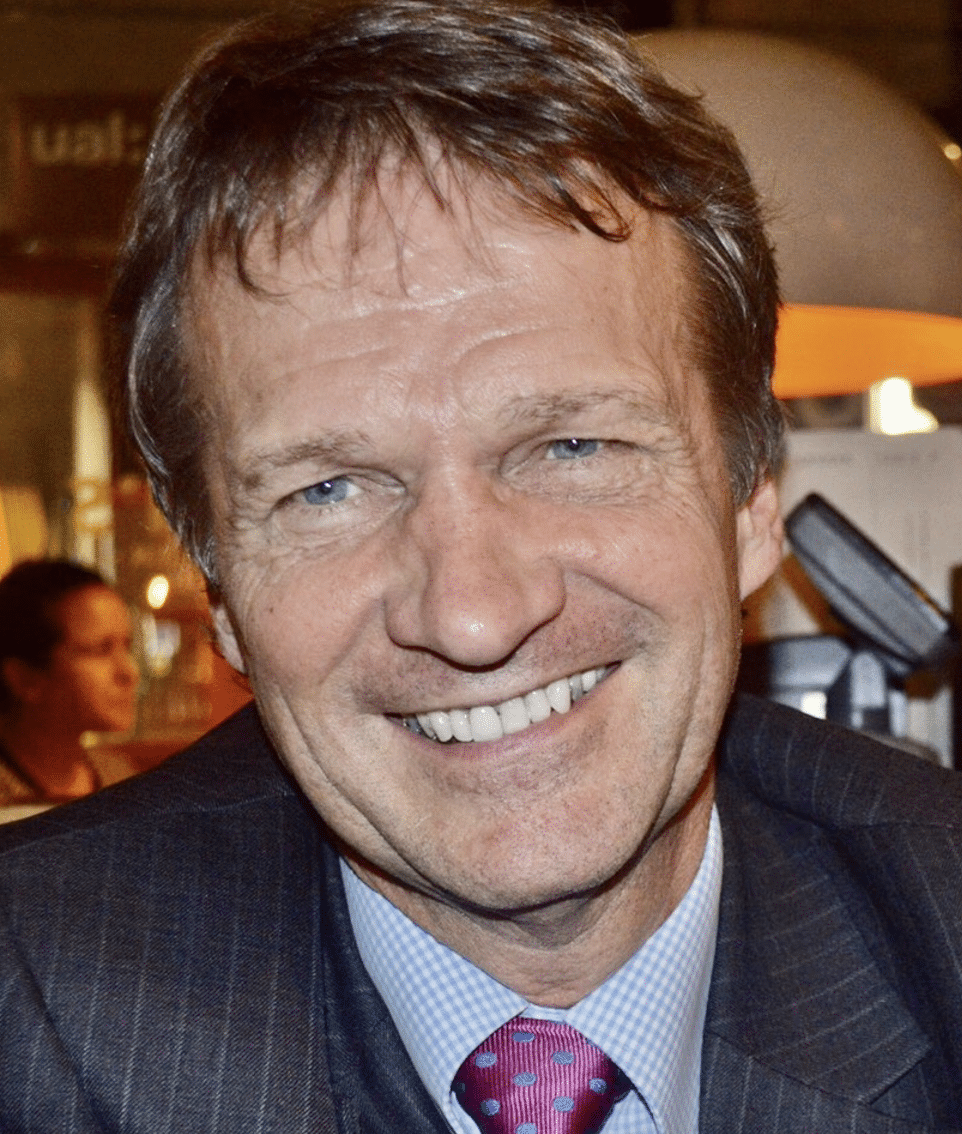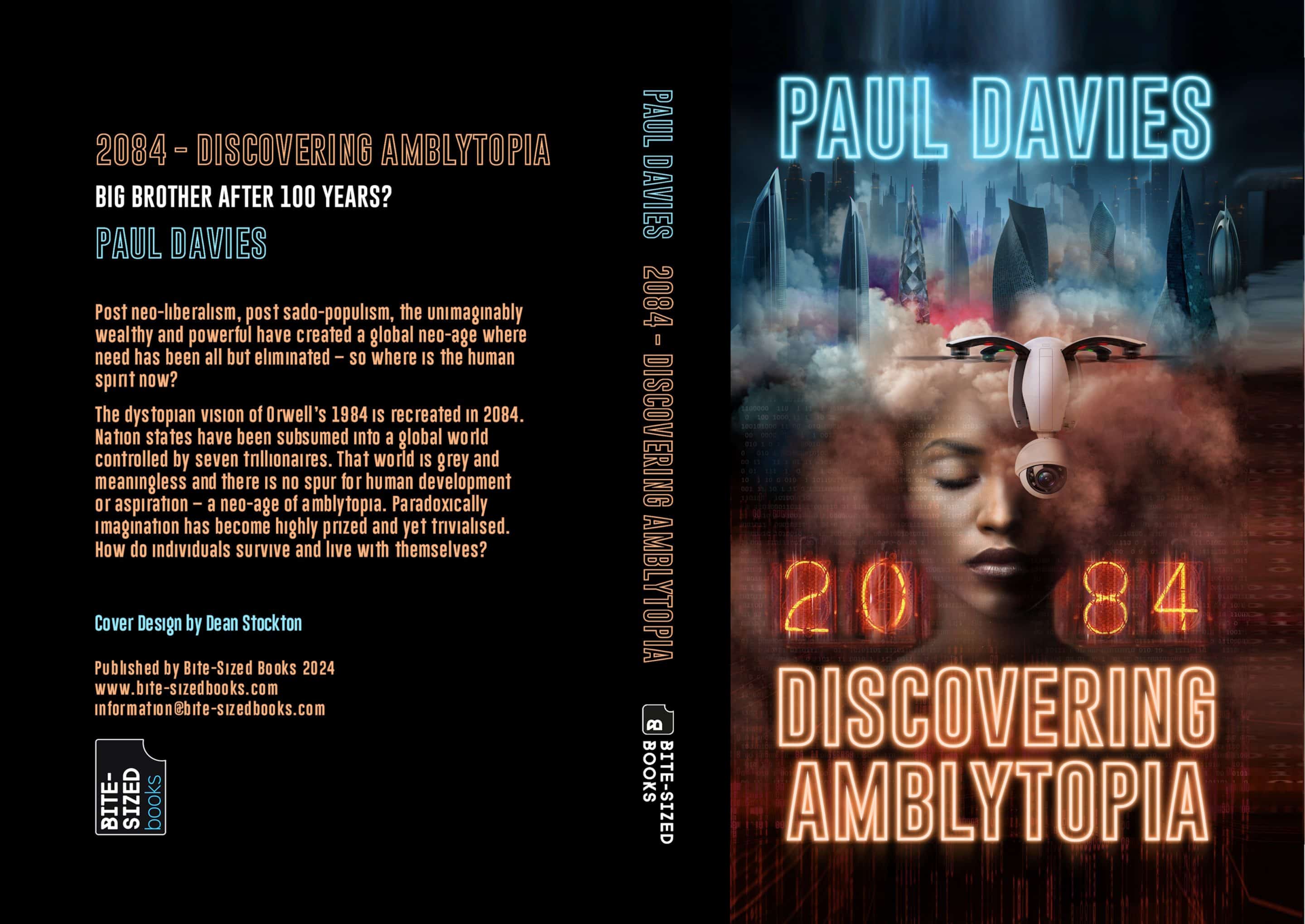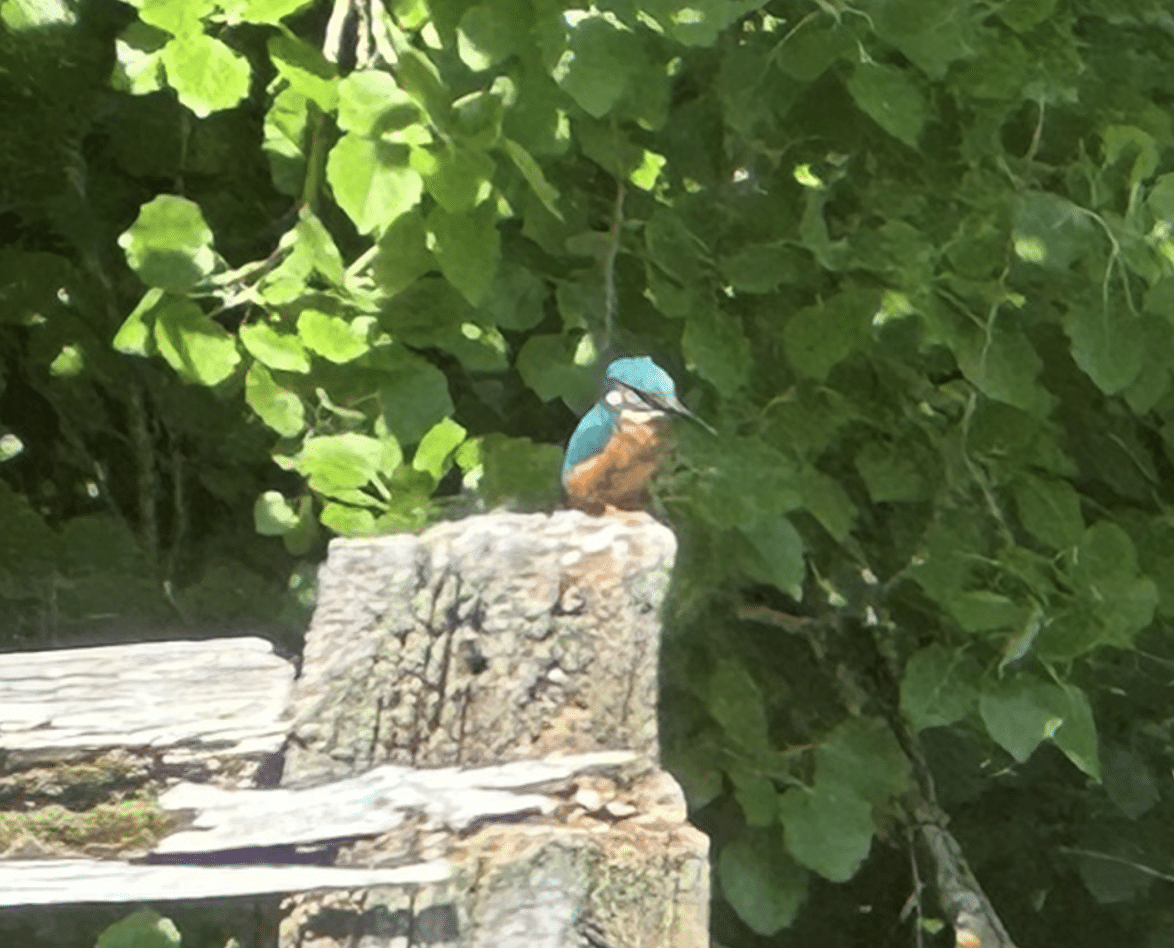An occasional series – No.1 Paul Davies
Julian Costley, CEO & publisher at Bite-Sized Books, interviews some of our authors to provide further background to their books and to their approach to writing. And a little ‘behind-the-scenes’ glimpse of their life and influences.
In this edition Julian talks to author Paul Davies about his new novel, 2084 – Discovering Amblytopia, which has just been published by Bite-Sized Books, and about his other publications, his passion for the works of George Eliot, and his motivations and influences – from his time in India to his idyllic view of kingfishers from his Thameside garden.

JC
This is the third novel you have published with Bite-Sized Books and it is very different, set as it is in the future. What was the motivation to write about the future and why 2084?
PD
There were a number of stimuli that were troubling me about how the world and politics were developing, not least the huge concentration of wealth in a smaller and smaller number of people, the apparently irresistible rise in populism, the lack of political action in the face of the climate crisis, the growth of interference in national politics by foreign dictators such as Putin, the manipulation of social media and the general reliance on what were in fact pure lies and conspiracy theories. It felt to me analogous to what had happened in the thirties and while the post-war settlement in the forties had very much changed the social picture with the development of some welfare states and the increased purchasing power of the working and middle class in the US, there was the threat of Stalinism that had induced George Orwell to write that dystopian novel, 1984.
It all felt very bleak and I thought about writing a similarly dystopian novel where the concentration of power and wealth meant that populations were reduced to an oppressed existence but being an optimist at heart – though sometimes it’s difficult to find my heart – I wondered why and how things could change. I also thought that the current systems throughout the world could not survive as there are few times in history when people have suffered without protest, so if rebellions and revolutions broke out – what then?
I couldn’t imagine that the unbelievably wealthy and powerful would give up their positions but what if they accommodated people post rebellions and revolutions rather than oppressed them – in effect a new post-war settlement? Coupled with that, there was the increasing urgency of the climate crisis, the rise of new technologies such as thought transfer, which is already in its infancy, food synthesis and a beneficial artificial intelligence, which could mean that work became almost a privilege and certainly only optional. I thought this would create a new global order, but still under the control of the seven trillionaires – the Trills – who would be committed to a benign political settlement, as long as their power and influence remained untouched.
What sort of world would this be? I couldn’t believe it would be a utopia and I didn’t want to believe it would be the real dystopia that I feared is developing around us. On the other hand I saw a removal of ambition – what could you achieve in a world where need but not necessarily want had been removed? So what would this world be like?
I needed a new word – and went back to classical Greek for αμβλυς or ΑΜΒΛΥΣ – which is amblus or AMBLUS, meaning dull or with the edge taken off – hence amblytopia. Since this was a new world that I was creating, I decided that it was a process of discovering what Amblytopia – hence the title of the novel – would be.
I wanted, however, some real threads of optimism. In this amblytopian world need had been almost entirely eliminated, crime had become almost impossible, people were able to live their lives with much reduced fear, urgent action had been taken to stabilise the world climate, and racism and misogyny had been much reduced but the spur to achievement, what George Herbert had called the pulley, was much reduced. I deliberately made my protagonist a woman who was focused on developing new insights and new ways of experiencing life – an imagineer – but crucially a woman who could see nothing wrong with this neo-world.
I won’t give away her journey nor the ending – but I hope that you see the genesis of the novel was something that I felt most deeply.

JC
The two previous novels that we have published, Coming To – a Novel of Self Realisation and The Ways We Live Now – Civil Service Corruption, Wilful Blindness, Commercial Fraud and Personal Greed – a Novel of Our Time, have been very personal – or based on your personal experience at least. How was it different writing about something that is outside all of our experience?
PD
In one sense it was no different at all, because with my background in writing plays dialogue has always been hugely important to me and while I did invent some neologisms – which is why I included a Glossary in the book – I still focused on the conversations between people – either v-talking, that is using voice, or t-talking, that is using thought – so I was very comfortable with that. I did also have the pleasure of creating a neo-world with a whole new need for defined etiquettes in so many areas of life. What for example is it permissible to probe into someone’s mind when we have thought transfer? The book is subtitled Discovering and that was one of the joys of writing the book. And yes I was concerned that using v-talking and t-talking would be a difficulty for my readers – and yet, after finding it initially strange, people have adapted to it and found it intriguing and thought provoking.
JC
Of course, your business books, notably Contract Management for Non-Specialists, which is one of our best sellers, and Developing Personal Effectiveness in Business, are still popular and we are going to be republishing them in our forthcoming series of Bite-Sized Business Books. Which do you prefer to write?
PD
I have published about ten business books over the years, starting with technology books, then introducing India to the business world with What’s This India Business?, and I really do like being able to write accessible, easy to read and focused business books. One of the ideas behind Bite-Sized Books was that most business books contain masses of information that is not relevant, and I wanted short business books that really did explain how to be successful in specific areas. I have always enjoyed writing business books, and I was always determined to make them easy to read. The first review of one of my books about India that appeared in the Financial Times complained that I was too simplistic, so I had a meeting with the reviewer, Edward Luce, in Delhi and I asked him whether he might have confused something that was easy to read with something that was simplistic – and to his credit he thought about it for a few minutes and said that I had a very good point.
But my first love has been writing novels and combining all that I understand and have a passion for has been the driving force behind them. Before I entered the commercial world I was a teacher of English and my PhD on the novels of George Eliot, focusing on their social and philosophical threads, with a particular love of her last novel Daniel Deronda, meant that I was a passionate advocate of her novels for their humanity, insights into people and her understanding of the role of women in an oppressive society. I just wanted to be able to write a novel that could emulate – not her style or her achievement – but her ability to excite, enthral and stimulate. Rather vainglorious, I know, but I always felt you had to have ambition.
JC
I understand that 2084 – Discovering Amblytopia took three years to write. So are you having a rest now it is published or are you already working on something else?
PD
When I reach the end of a long piece of writing – and novels take me a long time to imagine, work out, revise and revise, and complete – I do feel that I need a break, but this time I was no sooner finished than a new pre-occupation came to me. It’s partly because I have been editing the autobiography of a friend, Catherine Fail, who is a thalidomide victim. It is a brilliant, moving story that is so hard to read at times.
She addresses the fact that Distillers Company, who marketed the drug, and their lawyers, used every tactic in the book to obfuscate, delay, deny and in general increase the suffering of the children who were born disabled because of their drug, while fully knowing it had caused the disability. The people who ran Distillers and their lawyers largely escaped opprobrium.
My view is that it wasn’t Distillers or a law firm that did that to her and her fellow sufferers but men – and of course back then it was only men – and those men need to be named, blamed and shamed for taking the decisions they did so callously. Yes – of course, they are all probably all dead now – but the point is to name them so that current CEOs, chairs of corporations, other CXOs, and the individual lawyers who act for them, know that if they are guilty of inhumanity they will be exposed and vilified and can’t hide under the anonymity of a company name or a law firm.
That was why I was so doubly pleased with Mr Bates vs the Post Office because the men and women guilty of such vicious behaviour towards people they knew were decent, the lawyers and corporate officers who lied and apparently are still lying, were named. There’s the germ of the new novel!
JC
I know your experience of being a CEO in India for a US multi-national corporation is important to you. How do you think your experience of working with India has influenced you in business and personally.
PD
Personally it as had a great influence on me – and that is partly through the amazing friendships that I have had with Indians and partly through understanding an entirely different culture. From the first time I was in India, with its vibrancy, its indomitable refusal to be anything but itself, its squalor and its extreme poverty living side by side with extreme wealth, its oddities and its challenging sense of time – not for nothing is Indian Standard Time also known as Indian S T R E T C H A B L E Time – I fell in love with India.
Commercially it taught me a great deal. When I first sat my management team down to discuss the following year’s strategic plan and budget in India, it caused the huge amusement that I learnt to understand. The process started in July, had to be signed off by the end of September, and was due to be implemented in the following January. And being a US multi-national once signed off, it was commercial concrete. I soon learnt that in India tactical is today – strategic is next week – and plans were flexible, market driven and guidelines only. The humour was around the fact that we were a technology company, technology is always moving faster than you might think possible, and so planning what might be appropriate in a month or twos time was fine – but eighteen months in the future? That was beyond any Indian sense. And of course they were right.
JC
I know you were an avid reader when you were young – do you still read novels and non-fiction?
PD
Currently I am reading No Free Parking – The Curious History of London’s Monopoly Streets by Nicholas Boys Smith and thoroughly enjoying it, and as ever I am reading and slowly savouring one of George Eliot’s novels, currently Middlemarch. I also read a great many of the Bite-Sized Books submissions, and in particular I have been reading Ian Benn’s new book on how to be a business leader which is based on Ian’s wide experience and extremely valuable, and John Redwood’s new version of his book on the green revolution, The $300 Trillion Green Revolution, fascinating because it is not what you might expect. I recently read Parallel Lives by Phyllis Rose – and was just blown away by the sheer quality of the writing, the insights into famous Victorian relationships, and the sympathy displayed to the characters she was writing about.
JC
So what is life like for you in what is supposed to be retirement?
PD
This photograph from our windows overlooking a mill stream just off the Thames was taken on my birthday last year and sums up perfectly what it is like to live in Goring-on-Thames.

I’ve always had a wish to see a kingfisher properly ever since I had only seen that lightning flash of blue as one darted along the Thames. When we bought our current house the estate agent or realtor had a video in which he, in what I thought was typical estate agent hyperbole, said that the house had its own pair of kingfishers. And yet there they were!
In defence of my view of estate agents, it was about the only thing that was true!
JC
Paul, our thanks, and we await the next novel! And of course, if you’d like to buy Paul’s book here’s the link:

